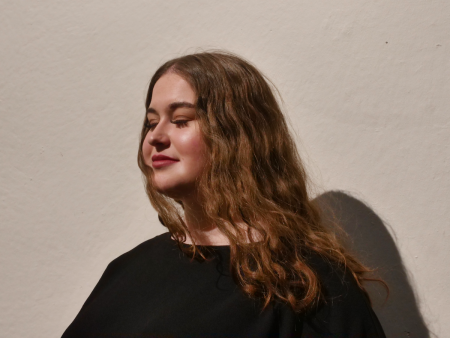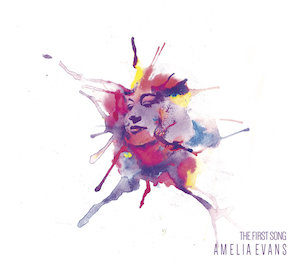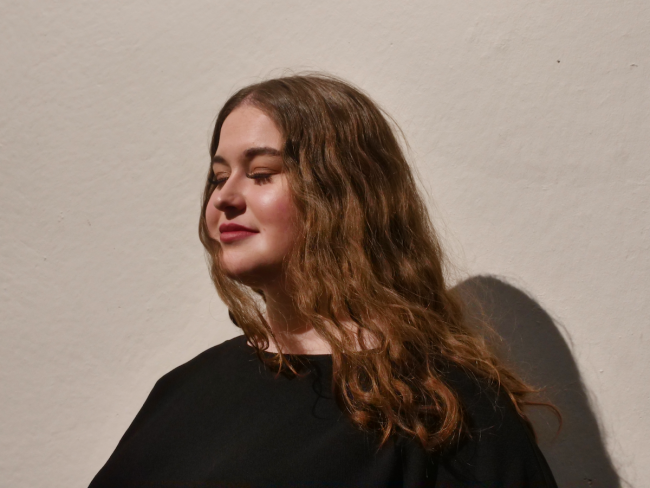Approx. 7 minute 30 second read
One of the most endearing and enduring jazz vocal ensembles is Lamberts, Hendricks & Ross. I fell in love with their rendition of Twisted (a vocalese written by Annie Ross) a while back and it’s been boppin’ around my head ever since. It’s been the gold standard of the standard! …Or it was until I came across the amazing voice of Amelia Evans and her effortless version of this much loved number on her debut album, The First Song. Amelia nails the gymnastic vocal line with no more than an upright bass, played by Ben Robertson, to accompany her.

It’s a great recording and it is easy to see (or hear rather) why she is a recipient of the James Morrison Generations in Jazz Vocal Scholarship. Read on to learn more about this talented young musician.
Sonia de Freitas: Hi Amelia, how are you and where does our interview find you today?
Amelia Evans: Hi Sonia. It’s a beautiful, sunny day in Melbourne so I’m doing very well. I’ve spent today at home preparing for some upcoming gigs. Looking forward to getting back out there after our brief lockdown in Victoria.
SdF: Can you tell me about your journey in music? When did you know that you were going to make music your career?
AM: I can’t remember a time when I wanted to pursue anything other than music as a career. I’m extremely grateful to have grown up in a family of professional classical musicians, who fostered my early music studies. I began piano lessons at the age of 4, and soon after joined the Australian Children’s Choir. At the age of 10, I began cello lessons and started to take singing seriously by commencing classical voice lessons. I was 12 when I broke it to my parents that I wanted to be a “famous opera singer!”
After many years dedicated to classical music lessons, everything changed when I travelled to Mount Gambier to attend the Generations in Jazz Festival with my high school. As a 16 year old, classically trained vocalist, I was absolutely inspired by the freedom of expression that jazz offered, and returned to Melbourne eager to begin working towards a career as a jazz musician. Three years later, amidst my studies as a jazz voice performance major at Monash University, I returned to Mount Gambier as the 2017 Generations in Jazz Vocal Scholarship recipient.

SdF: Your rendition of Twisted on your debut album The First Song is one of my favourites! Can you tell me about your creative process when producing this work? Is there anything particular you do that is special to your creative process?
AM: Thank you! It is one of my favourite vocalese to sing. Like many of the songs on The First Song, we recorded Twisted in just two takes. It is such a thrill when you come together with another musician to listen and respond to each other, almost like you are having a conversation. In these moments of improvisation and spontaneity, something very special is captured. During my creative process, it is important to be prepared and well-practiced prior to recording, so when I’m listening and responding in the moment, I have all the tools I need to create something exciting and unique.
SdF: Who is your sounding board? There must be someone that you trust to give you brutally honest feedback on your music. How do they fit into the process?
AM: I’m so grateful to be surrounded by family, peers and mentors whom I trust and frequently seek feedback from when I’m creating or performing. Melbourne based jazz singer, composer and educator, Michelle Nicolle has been a mentor of mine for many years, and was my voice teacher during my BMus studies. I auditioned for every institution Michelle taught at, as her incomparable wisdom, experience, and honesty is what inspired me to create and share music. After completing my studies, Michelle’s support is ever-present, and I approach most things I do with the question “what would Michelle do?”
SdF: What was the first song that you remember making an impact in your life and why was/is it so important?
AM: The Beauty Of All Things composed by Laurence Hobgood and Kurt Elling, was one of the first compositions that I learnt that left me truly inspired. Hobgood’s music challenged my musicianship and understanding of improvisation, whilst Elling’s lyric left me enlightened. Elling’s virtuosity and technique is what I aspire to achieve as a jazz vocalist, and he continues to inspire the way I make music every day. As a 16 year old who had just begun to study jazz, this composition was a turning point in realising what I was put on this earth to do as a vocalist and human being.
SdF: Have you experienced particular challenges as a female musician? How did you overcome these challenges and what do you think needs to change for others to avoid these challenges in the future?
AM: As a female musician, and specifically as a vocalist, I have been faced with many challenges that have inspired resilience and an eagerness to master my craft. Experiences where a listener or fellow musician have made comments on everything but your musicianship, or you leave a gig feeling like you weren’t respected by your peers or industry professionals, can be frustrating and discouraging. It is often the case that the way I am treated prior to performing, changes dramatically once I have finished singing. As a female musician, every aspect of what I do, from my musicianship to my improvisatory skills, are put under a magnifying glass and judged profusely. Unfortunately, these experiences can turn away a lot of aspiring female musicians from pursuing a career in jazz or the music industry. However, these experiences often culminate in a sense of perseverance and determination to become the best musicians we can be, not for anyone else, but purely for ourselves.
In order to cultivate this eagerness to develop my musicianship whilst overcoming such challenges, I surrounded myself with supportive and highly skilled musicians that pushed me out of my comfort zone when it came to my knowledge as a jazz musician and improvisor. It is so important for me to not only work with brilliant human beings whom I share mutual respect with, but also work with individuals that help me develop my skills.
Future change requires much needed, widespread discussion in regards to the challenges that women in jazz face. Education institutions, courses, programs, workplaces and festivals need to further these discussions amongst musicians, students, educators, industry professionals, and design programs, performances, interviews, appearances that support female creators, commit to gender diversity within jazz, and offer aspiring female musicians with mentors and entry into a community that is diverse and inclusive.
SdF: So, what’s on the horizon for you? Any projects you’re working on or new releases to share?
AM: 2021 is set to be an exciting year for the Amelia Evans Quartet. I am currently working on my second album, which will mostly consist of original music, as well as compositions by some of the finest female musicians and composers in this country. After presenting a number of projects honouring Australian, female identifying artists, most recently opening for the Melbourne Women’s International Jazz Festival, this album feels like the next, natural step forward in celebrating the music of Australian women in jazz.
I am also thrilled to be presenting The Radiohead Project on Friday July 16th in the Melbourne Recital Centre. This project has been years in the making, and will be an evening featuring the music of Radiohead arranged for the modern jazz quartet.
SdF: What is your most memorable performance and why?
AM: It’s a challenge to pick one! But one of my most memorable performances would have to be in 2016 when I was invited to perform at the Melbourne Recital Centre for the Season of Excellence Series. I performed Wardell Gray and Annie Ross’ Twisted, alongside my mentor, friend and brilliant pianist Steve Sedergreen. The Elisabeth Murdoch Hall was a dream to sing in, and is one of the most resonant and beautiful spaces. It was an absolute joy!
SdF: What advice would you give to any aspiring musicians out there?
AM: 1. Don’t be afraid to make mistakes – being a musician is a life-long journey of self-discovery and expression.
2. Make music because you love making music. Sometimes you’ll find it hard to remember why you’re doing it. Surround yourself with people and music that inspires and helps you remember.
3. Listen, listen, listen.
To learn more about Amelia Evans visit: ameliaevansmusic.com
To buy Amelia Evan’s music visit: ameliaevans.bandcamp.com
To buy tickets to the The Radiohead Project for Friday July 16th, 7pm at the Primrose Potter Salon visit: melbournerecital.com.au
For more information on International Women’s Day visit: internationalwomensday.com
Keep an eye out for my next interview in the Shout Sister Shout series where I interview Mara Kiek.
Did you miss the previous Shout Sister Shout instalment? Read Zela Margossian’s interview here.
